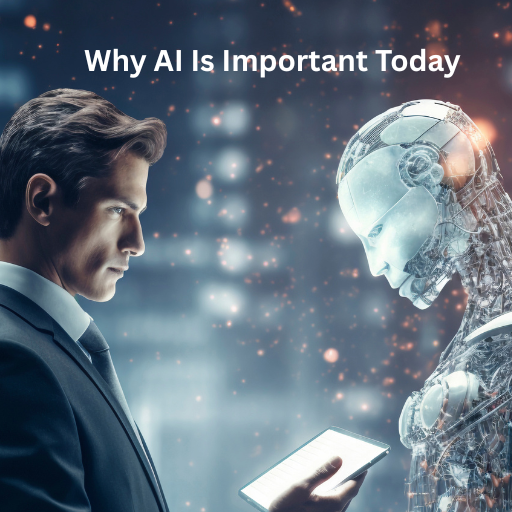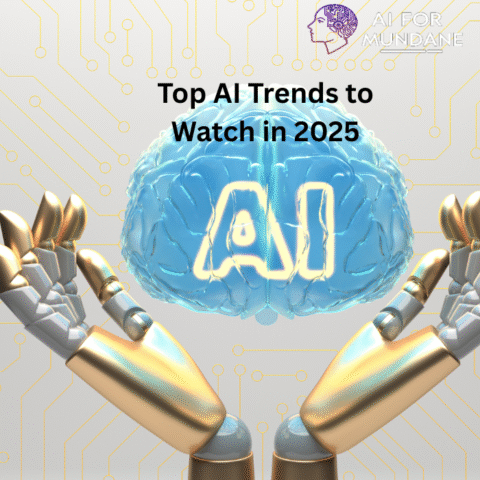Why AI Is Important Today
Artificial Intelligence (AI) might sound like a futuristic buzzword, but it’s already woven into almost every part of our daily lives. From asking your phone for the weather to the playlists streaming on your speakers, AI works behind the scenes—making tasks faster, smarter, and more personal.
This article breaks down, in simple language, why AI matters today, with real-world examples you’ll instantly recognize.
What Is Artificial Intelligence?
At its core, AI is about teaching computers to learn from data and make decisions or predictions—almost like a digital brain.
Instead of rigid instructions like “if X happens, do Y,” AI looks at patterns and past information to figure out what to do next. It includes areas such as:
Machine Learning: Teaching computers by showing examples (like thousands of cat photos so they learn to recognize cats).
Natural Language Processing: Systems like ChatGPT that understand and generate human-like text.
Computer Vision: Technology that identifies faces or objects in images.
These power everything from voice assistants to fraud detection.
Why AI Matters Right Now
Speed and Efficiency
AI can analyze huge amounts of data in seconds—tasks that used to take human teams days or weeks. Banks use AI to scan transactions and detect fraud instantly, saving time and money.
Personalized Experiences
When Netflix lines up shows you’ll probably love or Spotify creates a “Discover Weekly” playlist tailored to your taste, that’s AI in action. It keeps you engaged and often surfaces things you might never find on your own.
Better Decision Making
Governments and companies use AI to predict demand, manage inventories, or plan for weather risks. Even you can get smarter decisions with AI—just ask ChatGPT:
“Should I spend ₹20,000 on a new phone this month?”
and see a quick pros-and-cons list.
New Innovation
Researchers use AI to design energy-efficient buildings, discover new drugs, and predict which crops will thrive in changing climates. That speeds up breakthroughs that could help millions.
Accessibility
AI speech-to-text helps people who can’t type. Translation tools let you chat in multiple languages. Even complex tasks can become simple, friendly conversations with AI.
Automation at Scale
From chatbots answering customer questions to robots sorting packages, AI takes on repetitive work so humans can focus on creativity and strategy.
Cost Savings
AI streamlines manufacturing, logistics, and energy use—cutting waste and operating costs for companies, and ultimately benefiting consumers.
7 Key Reasons Why AI Is Important Today
Automation and Efficiency
AI scans hundreds of invoices in seconds, flags errors, and suggests payment schedules—so small-business owners can spend more time growing the business instead of combing through spreadsheets.Personalized Products and Services
Your food delivery app recommends restaurants and dishes based on past orders. It knows you like masala dosa on Sunday mornings and sushi on Fridays—AI makes sure you see it first.Smarter Decision Making
Retailers predict which products will sell out during festivals. You can build a personal budget in seconds by telling an AI chatbot your salary and savings goals—no Excel required.Advances in Healthcare
AI reads X-rays or MRIs to spot early signs of disease, sometimes more accurately than doctors. Virtual health assistants remind you to take your medicine or track symptoms via your phone.Better Safety and Security
Spam filters use AI to catch phishing attempts before they hit your inbox. Smart cameras learn to tell people from pets so you only get alerts that matter.Accelerating Research
AI predicts which chemicals might make effective medicines, speeding up drug discovery by years. It also models weather patterns to help cities prepare for extreme events.Inclusivity and Accessibility
Google Translate lets you chat in different languages on the spot. Screen readers use AI to describe images, helping visually impaired users navigate the web.
Everyday Examples of AI in Action
Voice Assistants
“Hey Siri, set an alarm for 6 AM.”
“Alexa, play my workout playlist.”
AI turns your voice into commands and acts instantly.
Smart Navigation
Google Maps analyzes traffic, accidents, and your driving patterns to find the fastest route home—saving time and fuel.
Streaming & Shopping Recommendations
Netflix suggests shows based on what you’ve watched.
Amazon highlights products you’re likely to buy next.
Financial Tools
AI budgeting apps like Cleo or Plum automatically track your spending, alert you to bills, and recommend how much to save each month.
Photo & Video Editing
Your phone camera uses AI to detect faces, adjust lighting, and apply beautiful filters—turning casual snapshots into professional-looking shots.
How You Can Start Using AI Today
Chatbots for Quick Help
Use ChatGPT or Bard to draft emails, plan meals, or brainstorm ideas.
Smartphone Shortcuts
Ask Siri or Google Assistant to remind you to drink water, check the weather, or control your lights.
AI Tools for Work
Try Grammarly for smarter writing, Canva’s AI background remover for designs, or Otter.ai to transcribe meetings automatically.
Budget & Finance
Connect your bank account to an AI-powered app and get daily spending breakdowns with zero manual tracking.
The Future of AI: Why It Still Matters
AI isn’t just a trend—it’s the technology shaping what’s next.
Autonomous Vehicles: Self-driving cars could cut accidents and reshape daily commuting.
Smart Cities: AI can optimize traffic lights, waste systems, and energy grids, making urban living smoother and more sustainable.
Personalized Education: Learning platforms will adapt to your pace and style, improving how students everywhere succeed.
As AI grows, it will keep opening new ways to solve problems and create opportunities.
Conclusion
The importance of AI today can’t be overstated. It’s already changing how we live, work, and play—through automation, personalization, better healthcare, and smarter tools that fit right into our lives.
Most AI tools are free or built into things you already use, so there’s no barrier to getting started. Whether you’re a student, professional, parent, or just curious, knowing how AI helps today means you can use it to make your life simpler, decisions easier, and dreams more achievable.
Follow AI for Mundane for more ways to harness AI in everyday life—without the jargon or overwhelm.






